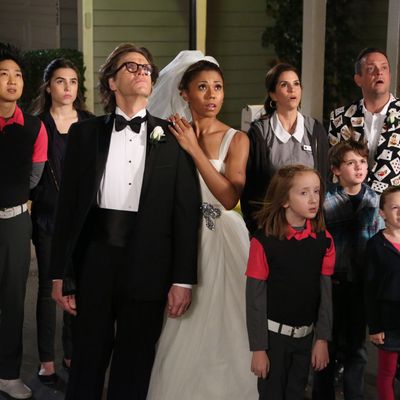
IÔÇÖm sad that The NeighborsÔÇÖ first season has ended. I never would have imagined typing that sentence when the show made ABCÔÇÖs prime-time schedule last summer, and yet there I was last night watching the season finale, marveling at the showÔÇÖs genial, committed weirdness and feeling affection for every frame of the damned thing.
The episodeÔÇÖs high point was the climactic montage that cut between the secretly extraterrestrial couple Larry Bird (Simon Templeman) and Jackie Joyner-Kersee (Toks Olagundoye) getting formally married in an Atlantic City casino after 462 years together. Back home, their gated community full of more secret extraterrestrials reacted to a visit from a supreme commander (George Takei) whose arrival had been heralded by pieces of toast inscribed with messages. He had come to tell the faux suburbanites that he was pulling the plug on their mission to gather intelligence in advance of an invasion. The soundtrack music was Alison KraussÔÇÖs ÔÇ£When You Say Nothing at All,ÔÇØ and it worked eerily well with images of starships hovering over townhouses and boots clomping on pavement.
Like so many sequences on The Neighbors, this one managed to be silly, affecting, derivative, and unnervingly fresh. ItÔÇÖs all in the execution. The showÔÇÖs premise ÔÇö aliens pose as suburban humans; slapstick misunderstandings follow ÔÇö isnÔÇÖt new. Besides the obvious antecedent 3rd Rock From the Sun, the show owes quite a bit to The Munsters and The Addams Family, as well as the film turned TV series Alien Nation, and the roots go back further than that. Science fiction and horror have been commenting on allegedly ÔÇ£normalÔÇØ modern life forever; thatÔÇÖs pretty much what the genres were invented to do. The interplay between the extraterrestrial family and their human neighbors, the Weavers ÔÇö Debbie (Jamie Gertz), Marty (Lenny Venito), Max (Max Charles), Abby (Isabella Cramp), and Amber (Clara Mamet) ÔÇö is classic fish-out-of-water stuff, with the earthlings instinctively defending rituals and traditions they took for granted before, then viewing them with skepticism for the first time, even as the aliens scrutinize them, find meaning in them, embrace them, and reinvigorate them. ÔÇ£We all know how this script ends,ÔÇØ Larry said in last nightÔÇÖs episode, summing up sitcom history in one brief monologue. ÔÇ£You tell us youÔÇÖre going to do something, we say weÔÇÖre going with you, you say no, we go anyway, hijinks ensue, you learn from us, we learn from you, and it all gets wrapped up in a nice, tidy package, usually around 9 p.m.ÔÇØ
The distinctive things about The Neighbors are its brilliant comic acting, its merger of ÔÇ£Just kidding!ÔÇØ comedy with pathos and body-horror, and its knack for applying fresh (alien) eyes to situations that we humans take for granted. The Halloween, Thanksgiving, and Christmas episodes sent up the hypocrisy, absurdity, discomfort, and joy of those holidays as well as any sitcom IÔÇÖve seen. An episode a couple of weeks ago examined suburbanitesÔÇÖ resentment of and fascination with the big city by way of original songs by Alan Menken; the climactic number parodied an end-of-act-one Broadway showstopper, cross-cutting between characters in different locations as they sang of their dreams and desires. A montage at a shopping mall in an early episode filmed the mallÔÇÖs escalators, food courts, and backrub stations with dreamy reverence, gliding past them in Mel Gibsonian slow-motion.
ThereÔÇÖs plenty going on within the slapstick, including commentary on urban snobbery, white flight, immigration, assimilation, ÔÇ£blendedÔÇØ families, homophobia, interracial relationships, and racism. (In the Thanksgiving episode, Marty initially freaks out when Debbi invites the neighbors over, because his own parents, old-school racists, are visiting, too, but he calms down when he realizes thereÔÇÖs an upside: ÔÇ£When my parents see a white guy with a black lady, an Asian kid and a redhead, theyÔÇÖre not gonna be much into conversation.ÔÇØ) There are some marvelous farcical setups, some of which build to a fever pitch of absurdity. In one episode, Larry helps Debbie wrest control of the Parent-Teacher Association from her nemesis (Nora Dunn), a petty despot who wonÔÇÖt let Debbie peddle her gingerbread cookies at the school bake sale. Larry orders his son Reggie Jackson (Tim Jo) to drop a robot gingerbread man through the mail slot of the despotÔÇÖs home; then Larry inhabits the cookie robot via remote-controlled, virtual-reality puppetry, stalking the woman through the house like the demonic voodoo doll in Trilogy of Terror. The next morning, sheÔÇÖs so rattled that she can hardly speak, whereupon Larry delivers the coup de gr├óce, holding up a gingerbread man as if warding off a vampire with a crucifix.
The showÔÇÖs best episode to date might be ÔÇ£Juan of the Dead,ÔÇØ in which the death of the local gardener sparks a meditation on the inevitability of death. The extraterrestrials initially think theyÔÇÖre immune to it, but since theyÔÇÖve been living in human bodies for years, that may no longer be the case. JuanÔÇÖs memorial service is a travesty of sincerity; Larry interrupts the priestÔÇÖs eulogy, points at the gardenerÔÇÖs coffin and says, ÔÇ£Tell me about the wooden boat!ÔÇØ and at the end, the group sings ÔÇ£IÔÇÖve Been Working on the Railroad,ÔÇØ of all things. Larry, an arrogant man who refuses to accept any sort of defeat, resurrects Juan with a potion given to him by his father. The result is an obscenity: a blank-faced zombie who has to be packed off to a relativeÔÇÖs home in another town. Larry admits to Marty that he resurrected Juan because ÔÇ£I felt powerlessÔÇØ in the face of death. Who hasnÔÇÖt?
ÔÇ£I feel I just need another six, maybe seven more seasons ÔÇö uh, years ÔÇö before I can figure it all out,ÔÇØ Larry told his commander father in last nightÔÇÖs finale. ÔÇ£Four would be fine,ÔÇØ Debbie amended. IÔÇÖll take whatever ABC is willing to give us. The Neighbors is a ludicrous, radiantly special show.


